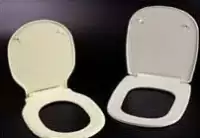Why this hi-tech,luxury toilet costs £10000
A warm toilet seat isn’t most people’s idea of heaven, typically indicating a previous occupant only recently departed. And turning to your side to find no toilet paper, only smooth walls and a remote control, may seem positively hellish. However, this remote control has washing and drying options. Press it, and a robot arm slides out underneath you, offering a range of water jet speeds and angles, followed by a hot air finale. When you stand up, the toilet closes its lid, flushes itself, and then self-cleans using UV-light.
The Toto Actilite series with Washlet (the robot washing wand) is commercially available for a mere £10,000 ($12,500). It is, perhaps unsurprisingly, a Japanese brand, but since opening a London office in 2009 it has been trying to break the more squeamish European market, and there are many other competitors on the horizon. Far from being the preserve of the super-rich, such hi-tech toilets may one day improve sanitary care the world over.
It’s not like a car wash - you don’t just sit down and hope for the best
But first, the basics. How does it work? You may be concerned about letting a robot near your private parts, but Floyd Case, UK Specification and Projects Manager at Toto Europe assures me that there is no need for fear. “It’s not like a car wash, you don’t sit down and hope for the best! As you sit down there is a sensor on the seat so it knows you are there. If nothing else you’d notice it’s a heated seat, which is nice, and the deodoriser would work, so it smells good. If you want to wash yourself, you have a remote control with two options – rear wash, which does as the name suggests, or front wash, sometimes called ‘ladies’ wash’.”
The robot ‘wand’ is then summoned from its pressure-washed enclosed chamber and cleans you with a spray of “around 70 droplets of water per second. You can adjust the position of the wand, the intensity of the water, and of course the temperature, using the remote control. You can then use the dry function to dry you using hot air.”
It is also incredibly hygienic. The flush ‘electrolyses’ the water, which rips up dissolved salts to produce a slightly acidic solution that will kill bacteria. It also contains a UV light that comes on when the lid is closed, which interacts with a ‘photo-catalytic surface’ on the ceramic bowl to break down anything biodegradable.
Toilet hacking
The Satis G-Type, made by Lixil, also a Japanese company, has many similar functions – although it prefers the term ‘nozzle’ to ‘wand’ – and is a relative bargain at around £4,000 ($5,000). Bluetooth-connected, you can control its personal washing functions (spray pattern, water and air pressure) using the “My Satis” smartphone app. The app includes a “toilet diary” so that – if you really wanted to – you can keep track of your bowel movements to monitor your health.
Lixil has had to consider the possibility of hacking – what if someone took control of your nozzle?
As with anything residing in the internet of things, Lixil has had to consider the possibility of hacking – what if someone took control of your nozzle? “There are several steps required to control a Satis toilet remotely,”, says Martin Mizutani, global new product development director of Lixil Water Technology, reassuringly. “Operation of a Satis toilet using a smartphone requires completing a pairing process, which establishes a one-to-one connection between the Satis toilet and a specific smartphone. The function then only works when the toilet lid is open, while the "My Satis" app can only be used by a single user at a time. This prevents any third party from accessing the toilet at that time.”
A restaurant review recently talked more about the washlet experience than the food
Both Toto and Lixil are popular in Japan. According to Lixil, some form of warm-water bidet toilet seat is used in more than 80% of Japanese households. But global consumers are proving harder nuts to crack. “Of course there is the giggle-factor,” admits Case. “As Europeans, we’re not used to intimate washing.” That said, Toto have sold over 40 million toilets with washlet wands – which start from around £1,500 ($1,870) – internationally. And beyond the mansions of the mega-rich, they are popular in high-end hotels and restaurants. “It’s one of the last areas that hotels can still be more luxurious [than homes],”says Case. “The washlet experience is quite memorable. There was a restaurant review recently which talked more about the washlet experience than it did the food.”
This may sound like the height of luxury, but there is a more serious need for smarter sanitary technology, and some of these development may benefit the world’s poor as well as the rich. Garv Toilets are free-to-use public toilets in predominantly poor parts of urban India, designed to be self-sustainable in terms of energy usage, waste disposal and maintenance, with smart technologies such as sensors and radio-frequency identification (RFID) tags integrated into them. Made from gleaming, vandal-proof stainless steel, LED lights and exhaust fans switch on automatically when users open the toilet door. When the visit is over, the same technology automatically activates the floor and toilet pan washing systems. A remote dashboard tracks data on numbers of users and how many times they flushed and used the soap dispensers.
Smarter toilets may also be a crucial element of future healthcare. According to the Toilet Board Coalition, a business network to promote better sanitation, your toilet may even save your life. “They will transform from being dumb buckets that remove waste to smart medical devices that upcycle health data and sync us up with our doctors.”
How far off is that future? According to Floyd Case, Toto is already doing it. “We have sold thousands of toilets for hospitals in Japan, that wash and dry you, but also weigh you and analyse your urine”. In time, he says, domestic toilets will do that too, uploading the data to your smartphone. But they don’t want to rush this technology to market before consumers are ready, he says: “At the moment, people are still wowed by a technology that Japan had 30 years ago.”
--
Join 700,000+ Future fans by liking us on Facebook, or follow us on Twitter, Google+, LinkedIn and Instagram.
If you liked this story, sign up for the weekly bbc.com features newsletter, called “If You Only Read 6 Things This Week”. A handpicked selection of stories from BBC Future, Earth, Culture, Capital, Travel and Autos, delivered to your inbox every Friday.
Cool~~! Wanna make a luxury toilet seat mold with cheaper price, contact us NOW: http://www.taiwanmoldmaker.com/product/toilet-seat-mold










